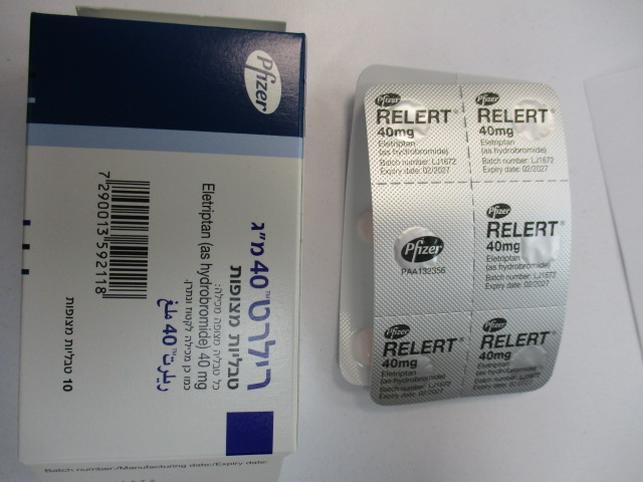Quest for the right Drug

רילרט 40 מ"ג RELERT 40 MG (ELETRIPTAN HYDROBROMIDE)
תרופה במרשם
תרופה בסל
נרקוטיקה
ציטוטוקסיקה
צורת מתן:
פומי : PER OS
צורת מינון:
טבליות מצופות פילם : FILM COATED TABLETS
עלון לרופא
מינוניםPosology התוויות
Indications תופעות לוואי
Adverse reactions התוויות נגד
Contraindications אינטראקציות
Interactions מינון יתר
Overdose הריון/הנקה
Pregnancy & Lactation אוכלוסיות מיוחדות
Special populations תכונות פרמקולוגיות
Pharmacological properties מידע רוקחי
Pharmaceutical particulars אזהרת שימוש
Special Warning עלון לרופא
Physicians Leaflet
Special Warning : אזהרת שימוש
4.4 Special warnings and precautions for use RELERT® should not be used together with potent CYP3A4 inhibitors e.g., ketoconazole, itraconazole, erythromycin, clarithromycin, josamycin and protease inhibitors (ritonavir, indinavir and nelfinavir). RELERT® should only be used where a clear diagnosis of migraine has been established. RELERT® is not indicated for the management of hemiplegic, ophthalmoplegic, or basilar migraine. RELERT® should not be given for the treatment of ‘atypical’ headaches, i.e. headaches, which may be related to a possibly serious condition (stroke, aneurysm rupture) where cerebrovascular vasoconstriction may be harmful. Reports of transient and permanent blindness and significant partial vision loss have been reported with the use of 5 HT1 agonists. Since visual disorders may be part of a migraine attack, a causal relationship between these events and the use of 5 HT1 agonists have not been clearly established. Eletriptan can be associated with transient symptoms including chest pain and tightness, which may be intense and involve the throat (see section 4.8). Where such symptoms are thought to indicate ischaemic heart disease, no further dose should be taken and appropriate evaluation should be carried out. Patients with cardiac failure RELERT® should not be given without prior evaluation, to patients in whom unrecognised cardiac disease is likely, or to patients at risk of coronary artery disease (CAD) [e.g., patients with hypertension, diabetes, smokers or users of nicotine substitution therapy, men over 40 years of age, post-menopausal women and those with a strong family history of CAD]. Cardiac evaluations may not identify every patient who has cardiac disease and, in very rare cases, serious cardiac events have occurred, in patients without underlying cardiovascular disease when 5-HT1 agonists have been administered. Patients in whom CAD is established, should not be given RELERT® (see section 4.3). 5-HT1 receptor agonists have been associated with coronary vasospasm. In rare cases, myocardial ischaemia or infarction, have been reported with 5-HT1 receptor agonists. Undesirable effects may be more common during concomitant use of triptans and herbal preparations containing St. John’s wort (Hypericum perforatum). Within the clinical dose range, slight and transient increases in blood pressure have been seen with eletriptan doses of 60 mg or greater. However, these increases have not been associated with clinical sequelae in the clinical trial programme. The effect was much more pronounced in renally impaired and elderly subjects. In renally impaired subjects, the range of mean maximum increases in systolic blood pressure was 14 -17mmHg (normal 3mmHg) and for diastolic blood pressure was 14 -21mmHg (normal 4mmHg). In elderly subjects, the mean maximum increase in systolic blood pressure was 23mmHg compared with 13mmHg in young adults (placebo 8mmHg). Post-marketing reports of increases in blood pressure have also been received for patients taking 20 and 40 mg doses of eletriptan, and in non-renally impaired and non-elderly patients. Medication overuse headache (MOH) Prolonged use of any painkiller for headaches can make them worse. If this situation is experienced or suspected, medical advice should be obtained and treatment should be discontinued. The diagnosis of MOH should be suspected in patients who have frequent or daily headaches despite (or because of) the regular use of headache medications. Serotonin syndrome Serotonin syndrome (including altered mental status, autonomic instability and neuromuscular abnormalities) has been reported following concomitant treatment with triptans and selective serotonin reuptake inhibitors (SSRIs) or serotonin noradrenaline reuptake inhibitors (SNRIs). These reactions can be severe. If concomitant treatment with eletriptan and an SSRI or SNRI is clinically warranted, appropriate observation of the patient is advised, particularly during treatment initiation, with dose increases, or with addition of another serotonergic medication (see section 4.5). Excipients This medicinal product contains lactose. Patients with rare hereditary problems of galactose intolerance, total lactase deficiency or glucose-galactose malabsorption should not take this medicine. This medicinal product also contains sunset yellow which may cause allergic reactions. RELERT tablets contain less than 1 mmol sodium (23 mg) per tablet. Patients on low sodium diets can be informed that these medicinal products are essentially ‘sodium free’.
Effects on Driving
4.7 Effects on ability to drive and use machines RELERT® has moderate influence on the ability to drive and use machines. Migraine or treatment with RELERT® may cause drowsiness or dizziness in some patients. Patients should be advised to evaluate their ability to perform complex tasks such as driving during migraine attacks and following administration of RELERT®.

מסגרת הכללה בסל
התוויות הכלולות במסגרת הסל
| התוויה | תאריך הכללה | תחום קליני | Class Effect | מצב מחלה |
|---|---|---|---|---|
| ELETRIPTAN | ||||
| RIZATRIPTAN | ||||
| SUMATRIPTAN | ||||
| ZOLMITRIPTAN |
שימוש לפי פנקס קופ''ח כללית 1994
לא צוין
תאריך הכללה מקורי בסל
01/04/2004
הגבלות
תרופה מוגבלת לרישום ע'י רופא מומחה או הגבלה אחרת
מידע נוסף
